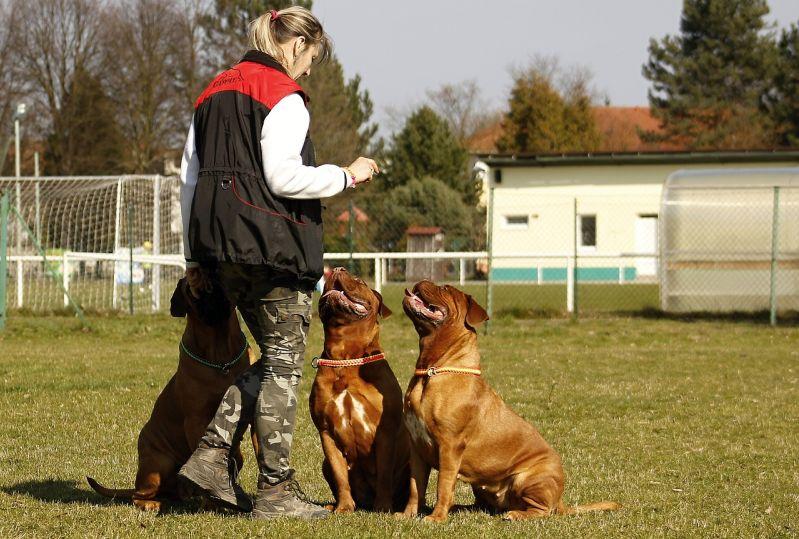In a world where canine companionship is often intertwined with the complexities of modern life, finding the perfect balance between obedience and playfulness can feel like an uphill battle for many dog owners. Enter the dog training boot camp—a structured haven designed to address behavioral challenges head-on while fostering a strong bond between pup and parent. This intensive program not only hones essential skills but also instills confidence and discipline in our four-legged friends, transforming mischief into mastery. As we delve into the world of dog training boot camps, we’ll explore what makes these immersive experiences a unique solution, the methodologies behind them, and how they can set both dogs and their owners on a path toward harmonious living. Whether you’re struggling with a stubborn leash-puller or a hyperactive ball-chaser, the journey toward a well-trained pup may just begin with a boot camp adventure.
Table of Contents
- Understanding the Essentials of Dog Training Boot Camps
- Transformative Techniques for Behavior Modification
- Choosing the Right Boot Camp for Your Dog’s Needs
- Integrating Boot Camp Lessons into Everyday Life
- Q&A
- Wrapping Up
Understanding the Essentials of Dog Training Boot Camps
In the realm of canine education, dog training boot camps serve as an intensive and effective means to instill essential behaviors in your furry companions. These programs are designed to encompass a myriad of training techniques that cater to both the dog’s individual needs and the owner’s goals. Participants benefit from structured routines, guided by professional trainers who emphasize consistency and positive reinforcement. Typical components of a boot camp curriculum include:
- Obedience Training: Learning commands such as sit, stay, and come.
- Behavior Correction: Addressing issues like excessive barking, chewing, or jumping.
- Socialization: Introducing dogs to various environments, people, and other animals.
- Leash Training: Teaching proper walking etiquette on a leash.
Training boot camps typically span several weeks, providing a comprehensive experience that reinforces learned behaviors through repetition and real-life scenarios. The immersive nature of these programs ensures that dogs become well-adjusted and obedient, while owners gain valuable insights into maintaining discipline outside the boot camp. Each training session is often tailored to reflect the unique challenges faced by each dog, ensuring personalized attention. A comparative view of various boot camp offerings can help potential participants choose the right fit. Below is a simplified table illustrating key factors:
| Boot Camp Feature | Basic | Intermediate | Advanced |
|---|---|---|---|
| Duration | 2 Weeks | 4 Weeks | 6 Weeks |
| Focus Areas | Basic Commands | Behavior Issues | Advanced Training & Agility |
| Owner Involvement | Minimal | Moderate | High |
Transformative Techniques for Behavior Modification
In the realm of canine education, transformative techniques can significantly enhance the learning experience for dogs and their owners alike. Positive reinforcement is a popular method, which rewards desirable behaviors through treats, praise, or playtime, ensuring that the dog associates good behavior with positive outcomes. This approach can be especially effective during a dog training boot camp, where concentrated learning times encourage quick assimilation of commands. Additionally, incorporating clicker training can further fine-tune communication between the trainer and the pet. The sound of the clicker serves as a clear and immediate signal that the dog has performed correctly, thereby solidifying the learning process.
Another transformative approach involves the establishment of consistent routines and clear expectations. Ensuring that commands are given in a uniform manner can eliminate confusion, making it easier for dogs to understand what is being asked of them. Engaging in socialization exercises allows dogs to interact with various environments and other animals, building confidence and reducing fear-based behaviors. Furthermore, using desensitization techniques can manage anxiety in dogs, gradually introducing them to triggers in a controlled manner, thereby fostering a calm demeanor. These strategies not only benefit dogs during training but also create a lasting bond between the pet and owner, cementing a lifelong partnership built on trust and understanding.
Choosing the Right Boot Camp for Your Dog’s Needs
When selecting a boot camp for your dog, it’s imperative to consider several factors tailored to your pet’s specific needs. First and foremost, evaluate the training methods employed by the camp. Look for camps that use positive reinforcement techniques, as these have been shown to foster a stronger bond between you and your dog. Additionally, assess the camp’s curriculum; some may specialize in obedience training, while others focus on behavioral issues or agility training. Here are some aspects to think about:
- Duration of the Program: Consider whether you want a short-term program or an extended stay.
- Facility Quality: Is the environment nurturing and safe? Check for cleanliness and maintainability.
- Instructors’ Credentials: Ensure trainers are certified and experienced in the methodologies they use.
Next, analyzing your dog’s temperament and behavior can guide your choice significantly. Understanding if your dog is shy, aggressive, or just needs a little fine-tuning will help you pick a boot camp that caters to these traits. A detailed assessment may look something like this:
| Dog Behavior | Recommended Boot Camp Focus |
|---|---|
| Shy/Fearful | Positive reinforcement and socialization |
| Aggressive | Behavior modification and training for impulse control |
| Energetic | Agility training and structured exercise |
Arriving at a decision involves not only considering training suitability but also the overall atmosphere of the boot camp. A nurturing and supportive environment is crucial for a dog’s development, as it can enhance learning outcomes. Visiting potential facilities and observing interactions between staff and dogs can provide insight into whether it’s the right fit for your canine companion.
Integrating Boot Camp Lessons into Everyday Life
After completing a dog training boot camp, it’s essential to weave the valuable lessons learned into your daily life for lasting results. This can be achieved by establishing a consistent routine that reinforces the commands and behaviors your dog practiced during boot camp. Incorporate training sessions into everyday activities, such as mealtime, walks, or playtime. For instance, utilize commands like “sit” or “stay” before feeding your dog or during walks to strengthen their patience and focus. Create an engaging environment where your dog can practice skills in various settings, helping them to generalize their training and respond appropriately, regardless of distractions.
Moreover, focus on positive reinforcement as a key strategy in your interactions. Keep a small stash of treats handy to reward your dog for good behavior, whether in a structured training session or in spontaneous moments throughout the day. This not only strengthens your bond but also makes training enjoyable for your furry friend. Regularly reviewing and expanding on the skills learned in boot camp can be structured into your weekly schedule, allowing for fun lessons that continue to evolve. Consider creating a simple chart to track progress and areas for improvement:
| Skill | Days Practiced | Notes |
|---|---|---|
| Sit | 3 | Great response, add distractions next week |
| Stay | 4 | Increased duration, boost confidence |
| Come | 2 | Practice in yard, reward immediately |
Q&A
Q&A: Exploring the World of Dog Training Boot Camps
Q1: What exactly is a dog training boot camp?
A: Think of a dog training boot camp as a specialized retreat for your furry friend. It’s an immersive program designed to teach dogs essential obedience and behavioral skills in a condensed timeframe. Led by experienced trainers, these camps often involve a structured daily routine filled with training sessions, socialization activities, and plenty of exercise.
Q2: Who can benefit from a dog training boot camp?
A: Almost any dog can benefit! Whether your pup is a rambunctious puppy with lots of energy, a rescue dog needing basic manners, or even an older dog requiring a refresher course, a boot camp can help. Additionally, owners who struggle with consistently training their dogs may find this intensive approach particularly valuable.
Q3: How long do these boot camps typically last?
A: Duration can vary, but most dog training boot camps run from a week to several weeks. Some facilities offer short-term programs, while others may have long-term options designed for more complex behavioral issues. Regardless of the length, the goal remains the same: to achieve noticeable improvements in the dog’s behavior.
Q4: What methods are used during training?
A: Training techniques can range from positive reinforcement and clicker training to socialization exercises and agility tasks. The specific methods employed will often depend on the camp’s philosophy and the individual needs of the dog. A well-run camp will prioritize humane and effective training strategies that foster a strong bond between dog and handler.
Q5: Is it just about obedience, or is there more to dog boot camps?
A: While obedience is a significant focus, many boot camps emphasize overall well-being and social skills. Activities may include supervised playtime with other dogs, mental stimulation exercises, and even basic agility training. The objective is to nurture a well-rounded dog equipped for both home life and social situations.
Q6: How do I choose the right boot camp for my dog?
A: Research is key! Look for boot camps with positive reviews, qualified trainers, and clear training philosophies. Visit facilities if possible, ask about their training methods, and inquire about follow-up support for owners. Most importantly, ensure that the environment is safe and stress-free for dogs.
Q7: What should I prepare for before sending my dog to boot camp?
A: Preparing for boot camp involves a few essential steps. Ensure your dog is up-to-date on vaccinations and flea prevention. Pack familiar items, like a favorite toy or bedding, to ease the transition. It’s also helpful to share your dog’s history, temperament, and any specific goals you have in mind with the trainers.
Q8: Will I still need to train my dog after boot camp?
A: Absolutely! A dog training boot camp sets the stage for good behavior, but ongoing practice and reinforcement are crucial. Consistency from owners helps solidify the skills learned at camp and ensures that your dog retains good habits long after the program concludes.
Q9: Can boot camps accommodate dogs with specific behavioral issues?
A: Many boot camps specialize in addressing behavioral challenges such as anxiety, aggression, or excessive barking. It’s important to communicate any specific concerns or behaviors with the trainers beforehand so that they can tailor the program to your dog’s unique needs.
Q10: What’s the ultimate goal of a dog training boot camp?
A: The ultimate goal is to foster a harmonious relationship between you and your dog. Boot camps aim not only to enhance obedience and manners but also to build confidence in your dog and equip them (and you) with the tools needed for a happy, well-adjusted life together.
By providing your dog with this concentrated training experience, you’re investing in a brighter tomorrow for both of you—a journey worth embarking on!
Wrapping Up
As we leash up this exploration of dog training boot camps, it’s clear that these immersive experiences offer much more than just obedience training; they provide a transformative journey for both dogs and their owners. By investing time in these tailored programs, pet parents can foster a deeper bond with their furry companions, unlocking the potential for a well-behaved pet that enhances daily life. Whether you’re grappling with behavioral challenges or simply seeking to enrich your dog’s socialization skills, a boot camp can be a valuable resource. Ultimately, it’s about understanding that training is not just an obligation; it’s a gateway to a more harmonious coexistence. So, as you consider options for your canine companion, remember that with patience, consistency, and the right guidance, you both can emerge from your training adventure with newfound skills—and perhaps, a happier tail wag. The journey towards better understanding and communication with your dog awaits; are you ready to take the first step?


